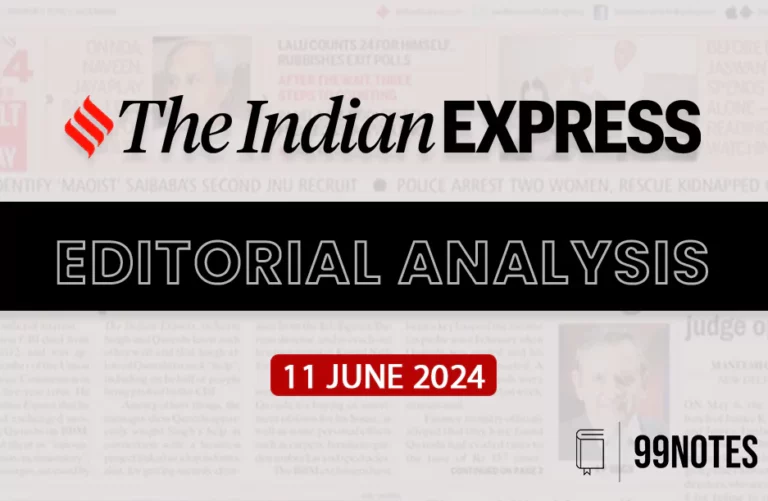15 Feb 2024 : Indian Express Editorial Analysis
Indian Express Editorial Analysis
15-February-2024
1. The new echo system
| Topic: GS4 – Public/Civil service values in Ethics & Public administration –Accountability and ethical governance This topic is relevant for Mains in the context of knowing facts about the role of state institutions in promoting social justice and safeguarding citizens’ rights. |
| Context: |
|
Attack on Students and Suppression of Dissent:
- The first narrative unveils an appalling incident where students of performing arts, in the midst of their examinations, are assaulted.
- The response from the university, instead of ensuring justice, adds to the dystopian reality.
- The head of the department, urged to file a complaint, is met with police action resulting in the arrest of the complainant and other victims.
- This sequence of events reflects the failure of the police and institutional mechanisms in safeguarding citizens’ rights and prosecuting perpetrators.
Threats and Suppression of Opposition:
- The second narrative unveils a chilling scenario where a public meeting critical of the ruling party faces intimidation.
- Office bearers of the ruling party openly issue threats, yet the police, instead of upholding the law, coerce the speaker to abstain from attending the meeting.
- Subsequently, an attack on the speaker’s vehicle ensues with impunity for those issuing threats.
- This narrative exposes the nexus between law enforcement agencies and the ruling party, eroding the democratic space for dissent and free expression.
The Complicit Role of Law Enforcement:
- These narratives shed light on the complicit role of law enforcement agencies, which, instead of upholding the law impartially, align themselves with the ruling party’s interests.
- The convergence of police actions with the ruling party’s political agenda, such as suppressing dissent and stifling opposition voices, blurs the line between law enforcement and partisan politics.
Implications for Democracy:
- The ramifications of these narratives extend beyond mere incidents, revealing deeper fissures within the democratic framework.
- The conflation of liberal values like freedom of expression with democratic principles exposes a fundamental misunderstanding of democracy.
- The rise of majoritarianism, coupled with the manipulation of public sentiment and electoral processes, poses a grave threat to democratic norms and institutions.
Challenges Ahead:
- As India approaches another national election, these narratives raise pertinent questions about the integrity of democratic processes.
- Are we witnessing the emergence of a pseudo-democracy, where elections are held but dissent is suppressed?
- Will manufactured majorities dictate the norms of governance, relegating genuine democratic principles to the sidelines?
Conclusion:
- These narratives serve as a wake-up call, urging society to confront the looming redefinition of democracy.
- The erosion of democratic values, coupled with the rise of authoritarian tendencies, threatens the very essence of democracy.
- Unless addressed urgently, these trends could culminate in a dystopian reality where differences, arguments, and criticism are stifled in the name of majority rule.
| Practice Question: Critically analyze the recent incidents of attacks on students, threats against public meetings critical of the ruling party. Discuss the implications of such developments for India’s democratic governance and suggest measures to safeguard citizens’ rights and promote accountability in law enforcement. (250 words/15 m) |
2. Farmers’ protest, lessons unlearnt
| Topic: GS2 – Governance – Government policies This topic is relevant for Mains in the context of the demands of the protesting farmers, which include issues related to social justice such as Minimum Support Price (MSP), farm loan waivers, and justice for victims of past incidents. |
| Context: |
|
Distinct Characteristics of Current Protests:
- The ongoing protests by farmers, although reminiscent of the 2020 farmers’ agitation, exhibit notable differences in terms of leadership, demands, and regional participation.
- Spearheaded by the Samyukt Kisan Morcha led by new figures like Jagjit Singh Dhallewal and Sarwan Singh Pandher, the current protests showcase a Punjab-centric focus, contrasting with the broader regional participation seen previously.
Fragmentation within Farmer Unions:
- Unlike the unified front presented in the previous protests, the current agitation witnesses fragmentation among farmer unions, each vying for prominence and engaging in a game of one-upmanship.
- This fragmentation complicates negotiations with the government and hampers the formation of a cohesive protest strategy.
Structured Demands and Government Response:
- The demands put forth by the protesting farmers reflect a more structured agenda, including legal guarantees of Minimum Support Price (MSP), withdrawal from the World Trade Organization, and justice for victims of past incidents.
- However, the government’s response remains reactionary, characterized by heavy barricading of borders, internet shutdowns, and reluctance to address the farmers’ grievances effectively.
Lessons from Past Protests:
- The current protests underscore lessons from the 2020 farmers’ agitation, emphasizing the importance of stakeholder consultations, long-term solutions, and political will in addressing agrarian crises.
- The delayed response to promises made by the government and perceptions of political opportunism further fuel discontent among farmers, highlighting the need for proactive governance and engagement with grassroots concerns.
Addressing Agricultural Challenges:
- Beyond the immediate protests, the underlying agricultural crisis necessitates holistic solutions addressing food sovereignty, security, and farmer livelihoods.
- Political will and concerted efforts are required to tackle systemic issues and provide sustainable support to the farming community, moving beyond short-term electoral considerations.
Conclusion:
- As India navigates the complexities of pre-election dynamics, including farmer protests and political posturing, proactive governance, and inclusive dialogue emerge as imperative.
- The challenges posed by agrarian distress and socio-economic disparities demand comprehensive strategies and genuine commitment from political leadership to foster sustainable development and address the root causes of discontent within the farming community.
| PYQ: What do you mean by Minimum Support Price (MSP)? How will MSP rescue the farmers from the low-income trap? (150 words/10m) (UPSC CSE (M) GS-3 2018) |
| Practice Question: Assess the challenges posed by agrarian distress and propose strategies for addressing the underlying issues to ensure sustainable development and social equity in India’s agricultural sector. (150 words/10 m) |
For Enquiry

15 Feb 2024 : Indian Express Editorial Analysis

15 February 2024 : The Hindu Editorial Notes PDF

15 February 2024 : PIB Summary for UPSC

UPSC CSE 2024 Notification

14 Feb 2024 : Daily Current Affairs Quiz

14 Feb 2024 : Daily Answer Writing

14 February 2024 : The Hindu Editorial Notes PDF

14 Feb 2024 : Daily Current Affairs

14 Feb 2024 : Indian Express Editorial Analysis

14 February 2024 : PIB Summary for UPSC
Indian Express 15 Feb 2024 : Indian Express Editorial Analysis Indian Express Editorial Analysis
14-February-2024
1. An Arabian Valentine
Topic: GS2 – International…
Feb 2024 The Hindu 15 February 2024 : The Hindu Editorial Notes PDF The Hindu Editorial
15-February-2024
1. A demand that could hamper gender equality
Topic: GS2 –…
feb 2024 PIB 15 February 2024 : PIB Summary for UPSC PIB Summary for UPSC
15-February -2024
1. 16th Finance Commission holds first meeting under Chairmanship…
Blogs Upsc UPSC CSE 2024 Notification UPSC CSE 2024 Notification
14-Feb-2024
UPSC Notification 2024 PDF
UPSC CSE 2024 Notification: –
Examination…
Daily Quiz 14 Feb 2024 : Daily Current Affairs Quiz 14 Feb 2024 : Daily Quiz…
mains answer writing 14 Feb 2024 : Daily Answer Writing Mains Answer Writing
14-February-2024
Q1) Explain the primary lines of evidence supporting the theory…
Feb 2024 The Hindu 14 February 2024 : The Hindu Editorial Notes PDF The Hindu Editorial
14-February-2024
1. Old-fashioned trust and credibility bind India-UAE ties.
Topic:…
Daily Current Affairs 14 Feb 2024 : Daily Current Affairs Daily Current Affairs
14-February-2024- Top News of the Day
1. Farmers Demand Legal Guarantee for MSP…
Indian Express 14 Feb 2024 : Indian Express Editorial Analysis Indian Express Editorial Analysis
14-February-2024
1. An Arabian Valentine
Topic: GS2 – International…
feb 2024 PIB 14 February 2024 : PIB Summary for UPSC PIB Summary for UPSC
14-February -2024
1. A new method for sodium catalyzed synthesis of carbon nanotubes…


